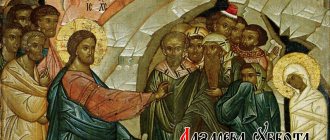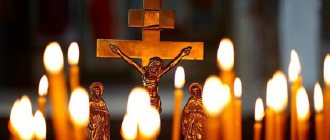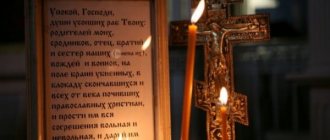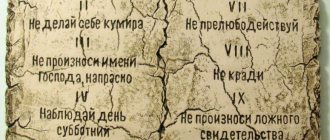Website of the Gorlovka and Slavic diocese
How to spend the seventh day of the week correctly? Do Orthodox Christians honor Saturday? What sacrifice does the Lord expect from us?
“Six days you shall work and do all your work, but the seventh—Sabbath—is a day of rest, which you shall dedicate to the Lord your God.”
Don't forget the first part of the commandment
The fourth commandment has two parts. In the first, the Lord God tells us to work for six days - to do what we are called to do depending on our talents. The fourth commandment is violated not only by those who work and do not go to church on Sunday, but also by those who are lazy to work on weekdays and shirk their responsibilities. The commandment says: “Work six days,” and we, having gone to work on Monday, look forward to Friday. On Sunday, instead of thanking God that we are alive, healthy and can work, we cry that we will soon go back to work. Those who do not work on Sunday also violate the commandment, but also do not devote this day to God, but spend it in everyday worries, entertainment, revelry and all sorts of excesses.
The second part of the commandment calls for leaving the seventh day for God and godly deeds. What are these things? Concern for the salvation of the soul, prayer in church and at home, studying the Word of God, enlightening the mind and heart with useful knowledge, pious conversations, helping the poor, visiting the sick and prisoners, consoling the mourning and other works of mercy.
Parents' Saturdays in 2022
In addition to commemorations after funerals, on the 9th, 40th day and anniversary after death, the Orthodox celebrate days of special remembrance , when prayers are offered for the souls of the departed with the entire strength of the Russian Orthodox Church. Such days are called “parental Saturdays” .
And then there is Radonitsa, which cannot be on Saturday , since it is celebrated on the 10th day after Easter, on one of the Tuesdays of the May holidays. Perhaps this is why Radonitsa is the most “celebrated” day of remembrance of ancestors. Radonitsa has a second name: “Parents' Day”.
Parents' Saturdays in 2022
Orthodox calendar of parental Saturdays 2022
When are Parents' Saturdays in 2022? The Russian Orthodox Church has established five parental Saturdays, the numbers of which change from year to year. In 2022, Orthodox Christians remember their ancestors on the following days:
- February 26, 2022 Ecumenical Meat Saturday (1st parental Saturday before the week of the Last Judgment).
- March 19, 2022 Parents' Saturday of the 2nd week (week) of Lent.
- March 26, 2022 Saturday of the 3rd week of Lent.
- April 02, 2022 Saturday of the 4th week.
- May 03, 2022 Radonitsa - Tuesday of the 2nd week of Easter.
- May 09, 2022 Day of special remembrance of deceased soldiers.
- June 11, 2022 Trinity Parents' Saturday (before Trinity).
- October 08, 2022 Pokrovskaya Saturday.
- November 05, 2022 Demetrius Parents' Saturday (before the day of remembrance of the Great Martyr Demetrius of Thessaloniki).
Parents' Saturday. Today is the time to remember our ancestors and perpetuate their memory while it is alive.
Create a memorial page for your parents!
✅ How to honor the memory of your parents
Saturday or Sunday?
The question may arise: why do the Orthodox honor Sunday and not Saturday, as, in fact, was commanded? Let's figure it out. In the Old Testament, Saturday was a day of remembrance of God’s creation of the world: “And God finished on the seventh day His work that He had done, and He rested on the seventh day from all His work that He had done. And God blessed the seventh day and sanctified it, for on it He rested from all His work, which God had created and created” (Genesis 2:2-3).
Saturday was the day when the Jews left all their affairs and devoted time to God, thanking Him for His blessings, for the fact that they were a free and beloved people, whom He brought out of Egyptian slavery. However, back in Old Testament times, the prophet Jeremiah wrote: “Behold, the days are coming, says the Lord, when I will make a new covenant with the house of Israel and with the house of Judah, not such a covenant as I made with their fathers on the day when I took them by the hand, to bring them out of the land of Egypt; They broke that covenant of mine, although I remained in covenant with them, says the Lord. But this is the covenant that I will make with the house of Israel after those days, says the Lord: I will put My law within them and write it on their hearts, and I will be their God, and they will be My people” (Jer. 31:31-33). .
For Christians, Sunday became a more important day - the day of remembrance of the resurrection of our Lord Jesus Christ. From the Acts and letters of the apostles we learn that on this day they received communion (“On the first day of the week... the disciples gathered together to break bread” (Acts 20:7)) and gave alms. John the Theologian calls this day not “the first,” but “resurrection”: “I was in the spirit on the day of resurrection” (Rev. 1:10). Since then, Christians also spend this day piously and rejoice at it, because it is the memory of the Resurrection of Christ and the promised salvation.
The Lord brought us a New Law, which is based not on prohibitions, but on love. He gave us this love. All great rulers and generals know that power cannot be retained for long by force and weapons. Christ holds power through love - and it has been unshakable for more than two thousand years. Power based on fear and hatred destroys over time. Christ brought the commandment of love, which has helped people live in joy for many centuries.
Annunciation coincides with Holy Saturday
It is very rare, but sometimes it happens that the Bright Feast of the Annunciation, when Archangel Gabriel informed the Virgin Mary about her pregnancy, coincides with one of the days of Holy Week or even with Easter.
This coincidence is explained by the fact that the Annunciation is celebrated in numbers, and Easter depends on the phases of the moon, or rather, the full moon.
The Saturday of Great Rest and the Annunciation coincide once every quarter of a century, and all Orthodox Christians witnessed such a coincidence in 2022. During temple services, the entire earthly journey of the Son of God is remembered, including the emphasis on the joyful news given by the Archangel.
The Virgin Mary was raised in a monastery and knew very well that the Messiah would come and what awaited Him. Having accepted the will of God in obedience, the Holy Mother of God, a simple earthly woman, had no idea how terrible the death of her Son would be.
Annunciation of St. Archangel Gabriel
Do Orthodox Christians honor Saturday?
Orthodox Christians adhere to the Holy Scriptures and Tradition and try to fulfill the laws given by God. We have a commandment to honor the Sabbath - and we honor it. For example, during Lent the full liturgy is not celebrated throughout the week - except Saturday and Sunday. As on Sundays, there is no strict fasting on the Saturdays of Pentecost. The liturgy on Saturday is as solemn as on Sunday. Finally, the Sunday day begins with Saturday evening worship. In no case does Orthodoxy cut or add anything, but observes everything that is said in the Holy Scriptures and Holy Tradition. This is very difficult to do in the modern world, because there are many radical forces around that are trying to split our faith, but we hold on and believe: the Lord is with us - so who will we fear?
On the Sabbath day no one should engage in everyday affairs
When our Lord created the earth, he sanctified the Sabbath day, among others, for a special purpose. Later he confirmed the peculiarity of this day when he gave the law at Sinai. Later, the holiness of this day was confirmed by both the apostles and even the Christians themselves.
For a long time now, many people have been interested in how our world came to be. Scientists have very different opinions on this matter, they come up with all sorts of theories. But it is the Sabbath that protects us from such misinterpretations and misconceptions.
Even the very first Christians knew that the Sabbath should be honored as a day to be dedicated only to God
Currently, Saturday and Sunday are recognized as days off for most Russians. People who accept the Sabbath as a special day that the Lord established, thereby confirm their faith and what was written in the Bible itself. And in the Bible we know that it is indicated that our world was created by God within 6 days, and we are also his creations.
Many people believe that to go to church you need to devote the seventh day, that is, Sunday. But as we see, we should still give more preference to the Sabbath.
How to spend the seventh day?
The commandments themselves do not save, the Lord saves. They are like flags that we shouldn’t cross. These are spiritual frameworks that hold us back, these are tips that help us walk the path of life with dignity and receive salvation.
Of course, we do not always manage not to work on the seventh day. If a person works for someone else, there is nothing wrong with that. For example, if on Sunday you go and clean the house of a sick person, work hard for him - this will not be a violation of the commandment. If you devote this day to chopping wood and don’t go to church and don’t pray, that is, you deliberately treat this day with disdain, then this, of course, is a sin.
God and neighbor
Sunday should be dedicated to God and neighbor. You can, after praying and taking communion, spend time with your family, call your parents or friends. You can sit down with your family and discuss issues that you didn’t have time to resolve on weekdays. Deal with them together, come to a common denominator - and it will be easier to move on through life.
The question may arise why you need to devote Sunday not to yourself, but to your neighbors. The fact is that for an Orthodox person this is very important. This is why we pray and receive communion, in order to love our neighbor. The fourth commandment calls us to dedicate the seventh day to God, but St. John Chrysostom writes: whoever loves God and hates his neighbor is a liar. Therefore, we must actively show our love. If we love God, we must serve people. After all, at the Last Judgment they will not ask us anything about the basics of theology; there very simple matters will be significant: did you feed the hungry, clothed the poor, did you call the lonely - after all, sometimes even an ordinary call can greatly support a person. We have all been isolated during quarantine and know how difficult it is to experience restrictions alone. Together it is much easier to overcome problems and troubles.
Christ did not abolish any commandments; He fulfilled the Old Testament law in full, but in addition to this, He brought us the main commandment - the commandment of love. That is why He healed and fed on the Sabbath day, to show people that the main thing is our neighbors, and that is why He said: “Truly I say to you, just as you did it to one of the least of these brothers of Mine, you did it to Me” (Matthew 25: thirty). To fulfill the fourth commandment, it is not necessary to look for someone in need somewhere far away; it can be every person whom God has brought to us at this moment.
For Russians, Saturday is also a break from everyday work.
Saturday is also a time of rest from all everyday work days. Especially nowadays, this day is very necessary for a person, since our society, which constantly suffers from stress and fatigue, needs rest. It is the Sabbath that offers a way out of these constant problems of modern life, and it also reminds us that the time has come to finally close the doors of our minds and take a break from the hustle and bustle of this world.
Saturday
rest from all everyday work for all Orthodox Christians
Those who have the opportunity to rest at home on holidays can devote both Saturday and Sunday to God. The main purpose of the Sabbath is to communicate with the Lord during worship in order to strengthen one’s faith.
Even in the book of the prophet Isaiah we see the following lines:
“Then from month to month and from Sabbath to Sabbath all flesh will come before Me to worship, says the Lord.”
Isaiah 66:23
Also in the book of Ezekiel we see the following lines:
“I have also given them My Sabbaths, that they may be a sign between Me and them, that they may know that I am the Lord who sanctifies them...And sanctify My Sabbaths, that they may be a sign between Me and you, that you may know that I am the Lord God your".
Ezekiel 20:12, 20
Time as a victim
Remembering the Sabbath means, in addition to the above, valuing the time we have. We can give it to God and people. We are all rich in time, but even so, God does not require great sacrifices from us, offering to devote only one day to Him. But a strange person is ready to go or go anywhere in the cold and rain to satisfy his needs - and cannot overcome himself to take care of his soul. God doesn't need our money, He waits for our gratitude. And we don’t even find two hours to come to the temple, thank Him for everything, cleanse our souls from the wounds that we inflicted on ourselves in six days. When taking care of the body, we must remember that our body is attached to our soul, and it is the soul that is the main thing we have. And the soul is renewed in the church. Therefore, let us observe the fourth commandment, it is very important for everyone who wants to remain human.
Archpriest Alexander Frantovsky
What to do in the temple and cemetery
First of all, believers certainly go to the nearest church to take part in the funeral service. As a rule, notes are submitted the day before, indicating the names of deceased people (in Old Church Slavonic, without last names and patronymics).
During the service, you can place a lit candle for repose on a special memorial table. If you don't see it right away, they will always help you find it.
Next, you can listen to the chants and offer a sincere prayer for the person who has passed into another world. You can pray in your own words or say a simple phrase out loud or silently:
These are special moments when the pain of loss is illuminated by a bright feeling, just as the fire of a candle, albeit a little, still illuminates a gloomy room.
The Christian faith (like many other religions) proceeds from the fact that the true nature of man is immortal. This means that his soul lives in the afterlife world. Moreover, believers in Christ will one day be resurrected, so we parted with our loved ones only for a while, but not forever.
After this, you can stay in church for a few more minutes and go about your business - to the cemetery or home to be with your loved ones.
If the commemoration takes place on Parents' Day (the second Tuesday after Easter), you can bring almost any food and drink to the church, except alcoholic ones. You should also not bring meat or meat-based products (sausages, smoked meats, etc.).
The food is usually simply given to those in need. The clergy, who at the same time commemorate the dead, can also taste it. By the way, each person can leave not only food, but also put a note there with the names of their deceased loved ones - they will be remembered especially.
Interestingly, this ritual is called “bringing food on the eve.” Among the people, the tradition is intertwined with bringing food and vodka to the grave, but this is far from the same thing. In fact, the church disapproves of libations in the cemetery, as well as at home, on Memorial Day.
Why bring food to the eve and give alms?
Sometimes believers experience a certain embarrassment, doubts and other unpleasant emotions associated with this ritual. Several questions arise at once, for example:
- Do you need to carry food?
- Will it really go to those in need?
- Will someone use it for selfish motives - i.e. just eat for free, and not remember the deceased?
As in many everyday situations, these questions should be answered based on conscience and common sense. It is also useful to listen to spiritually mature people and clergy, who will certainly help resolve spiritual doubts.
NOTE
If the memorial day falls during a fast (for example, the 4th Saturday of Lent), you can bring only lean foods - fruits and vegetables in any form, unsweetened pastries, mushrooms, etc.











